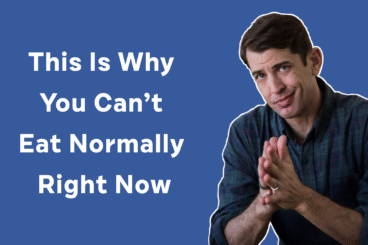Male mental health is a subject that’s just been increasingly of interest to me over the last decade of my practice as I’ve worked with lots of men. Also, over the past three years, my friend and colleague, Greg Scott Brown, a fellow psychiatrist, and I have been working with Men’s Health Magazine and created Friday Sessions. This has been an ongoing live conversation on Instagram where we’ve interviewed almost a hundred different men and women about male mental health, and I’ve been thinking about some of the lessons that we’ve learned and I wanted to share five of them today because mental health and male mental health is an ongoing conversation that we’re all learning from, we’re all learning about, and we all need to keep having.
Table of Contents
The striking statistics about male mental health are really concerning. The majority of deaths by suicide, about 80%, are men. Some of the statistics that we see about male mental health, for example, are that women are twice as likely to get depressed as men. I’m not sure that’s really that helpful to us. If I’m a man with depression, that doesn’t help me think about wanting to go get treatment. We also know men struggle with different mental health disorders than women. In some ways, the most prominent of this is substance use. Substance use disorders will affect one in two men. That’s right, 50% of us during our lifetime will struggle with substance use disorders, whether it’s alcohol, cigarettes, cocaine or cannabis etc. I wanted to talk about some of the aspects and kind of ideas that have come from these great conversations we’ve been having and you can see all of them on the Men’s Health Instagram feed.
Vulnerability
So number one is vulnerability. Vulnerability is a common idea when it comes to male mental health that one of the barriers to men taking care of their mental health is they’re not willing to be vulnerable. We’re not willing to open up and share our inner thoughts. It comes from this very stereotypical notion of men as stoic, unemotional and strong. Vulnerability often is presented in a context that just opening up and sharing is the thing to do. I would say one thing that I’ve learned is that vulnerability is complicated. Many men I speak with about vulnerability, and sharing their inner world and their emotional life, often quickly recount a story in which something they shared, an emotional moment, a secret, a vulnerable aspect of themselves was used against them or to hurt them. That is a very common experience for men. It teaches us also about vulnerability. To be effective, vulnerability has to have the appropriate context. I think NBA star, Jimmy Butler said this best when we were speaking with him. He noted that vulnerability is only for people that you really trust and within a setting that has space for that vulnerability. It might sound obvious to not share all your inner business with everybody, but as we’re trying to open up a conversation about mental health, I’d like us to see more sharing and more vulnerability and to start doing that, most men need to consider who is that person or people who they can be vulnerable with first.
Have a mental fitness routine
Number two is have a mental fitness routine. So many of the successful men and women that we’ve spoken with about male mental health remind us that they have a mental fitness routine. The co-founder of Twitch, Justin Kim, he has a great mental fitness routine and describes in detail his transition from being an overworked tech bro, to being somebody who really values mental fitness and mental health and had specific thoughts and rituals that he would engage in to take care of his mental health and promote his mental fitness. Whether this is going out in nature, joining a meditation group or a book club, there are lots of ways to take care of your mental health that are active. Oftentimes, men think mental health means sitting around meditating or other activities that don’t appeal to them and don’t feel active. We have a great course called Healing the Modern Brain, which is all about building mental fitness skills if you are interested in working on this such as thinking about, what’s the ultimate mental fitness morning for example.
Build mental health vocabulary
Number three is build a mental health vocabulary. A lot of the time this means uncomfortable words and uncomfortable feelings for men. For myself, as a man and a therapist, it took me a bit of time to learn the right words to use with people as they cry, grieve or struggle with severe mental health symptoms. In those situations, it took trying those words out to get them right. As a mental health professional, I’m accustomed to using some of these challenging words such as depression, anxiety, suicide, and they’ve become second nature to me. Also in popular society, as we see more folks embracing mental health conversations, building a vocabulary around mental health, to help us understand ourselves and other people is a wonderful aspect for us to work on, especially for men and people working with men.
Understanding mindfulness and self-awareness
Number four is understanding mindfulness and self-awareness. Mindfulness is a wonderful meditation. It is a technique of drawing our experience inward, focusing on all of our senses and all of the ways that we can experience the world. A lot of times though, mindfulness is considered out there in the wellness world to a lot of men and it often gets replaced with this notion of self-awareness. Mindfulness and self-awareness are very interrelated processes because to have true self-awareness requires a lot of mindfulness. You have to sit with your senses and feelings. Are you physiologically activated? Is your heart rate up? Are you sweating? Are you ruminating about some past negative experience? These are all questions that we want men to be thinking about when they are having powerful feelings and this is an an act of mindfulness and the utilization of mindfulness to increase self-awareness. It also relates to vulnerability. How do you know that it’s all right and in a good spot to be vulnerable? You have to have a lot of self-awareness to know when that is and who that should be with.
Masculine emotional repression has a cost
The last thing you should know about male mental health is that masculine emotional repression has a cost. If men are not processing their feelings, whether that’s joy and accomplishment, and sitting with the power and strength of that or whether there are more challenging and difficult feelings such as humiliation or struggling with the limits of our strength and power. This may also be having bad sleep or drinking too much. Whatever it is, it’s very important for men to stop repressing their emotions.
When we don’t allow the expression of something it’s not a great psychological defense because it prevents us from dealing with feelings. As a therapist, even more important than that, it prevents men from having an opportunity to use these feelings to gain more strength and have a better understanding of the self. That’s the real true long-term cost. You have these painful, challenging experiences and feelings and instead of processing them and then using those for strengths, they get buried inside and turn into all kinds of things. They come out in all kinds of ways. The worst of male mental health, when it’s not working is when we see men as aggressive, when we see men acting out.
When we can’t deal with feelings, a way to tune them down and numb them is to drink alcohol. So this idea that we want to work on some of these skills, like building more vocabulary and having self-awareness to help us in the expression and understanding of powerful emotions is really central to mental health. I’m appreciative that you’re interested in male mental health. It’s a huge issue. It’s really underrepresented, not really talked about a lot in mental health circles. I think that’s changing, and I appreciate your time and attention.



